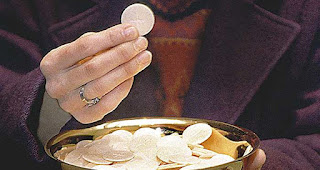Dear Parishioners,
I begin my bulletin with an excerpt of a speech given at the March for Life in Washington DC on January 24, 2020:
"All of us here understand an eternal truth: Every child is a precious and sacred gift from God. Together, we must protect, cherish, and defend the dignity and the sanctity of every human life. When we see the image of a baby in the womb, we glimpse the majesty of God's creation. When we hold a newborn in our arms, we know the endless love that each child brings to a family. When we watch a child grow, we see the splendor that radiates from each human soul. One life changes the world . . . As the Bible tells us, each person is wonderfully made . . . To all the moms here today, we celebrate you and we declare that mothers are heroes. Your strength, devotion, and drive is what powers our nation. Because of you, our country has been blessed with amazing souls who have changed the course of human history. We cannot know what our citizens yet unborn will achieve. The dreams they will imagine. The masterpieces they will create. The discoveries they will make. But we know this: every life brings love into this world. Every child brings joy to a family. Every person is worth protecting. And above all, we know that every human soul is divine and every human life, born and unborn, is made in the holy image of Almighty God."
"Which bishop or religious leader is being quoted here?” you may wonder. The speech comes from the current President of the United States, Donald J. Trump. The fact that he is the first President of our country ever to attend the March for Life speaks volumes to me. Other presidents may have made a phone call to the March attendees or sent a proxy. However, this year the sitting President was present and he spoke the above words. People who have faithfully attended the March year after year have waited decades for this to happen.
I have stated very clearly on numerous occasions that I am neither a republican nor a democrat. I see flaws in both parties. I consider myself an independent conservative. My only complete allegiance is to Jesus Christ as my Lord, God and Savior. However, looking objectively at what President Trump said and what his appearance at the March meant to all who respect the sanctity of every human life, he deserves our applause. I also commend Vice-President Mike Pence who is also staunchly pro-life, and Counselor to the President Kellyanne Conway (a graduate of St. Joseph High School in Hammonton, NJ where I was assistant principal for a time) for her continual support of the unborn.
I contrast the above with an excerpt from an acceptance speech from Michelle Williams at the recent Golden Globe awards. As she was accepting her Golden Globe award, she spoke the following:
“ . . . And I wouldn't have been able to do this without employing a woman's right to choose . . . To choose when to have my children and with whom, when I felt supported and able to balance our lives as all mothers know that the scales must and will tip towards our children. Now I know my choices might look different than yours, but thank God or whoever you pray to that we live in a country founded on the principles that I am free to live by my faith and you are free to live by yours. So, women 18 to 118, when it is time to vote please do so in your self-interest. It's what men have been doing for years, which is why the world looks so much like them but don't forget we are the largest voting body in this country. Let's make it look more like us."
All I could think of was the award she was now holding instead of the child that should-have-been. I don’t know her situation and the circumstances surrounding it. What I do know is that she made a “choice” that can never be reversed and because of it she is holding a golden idol instead of a living child.
Fr.
Ed Namiotka
Pastor
Michelle Williams at the Golden Globes





